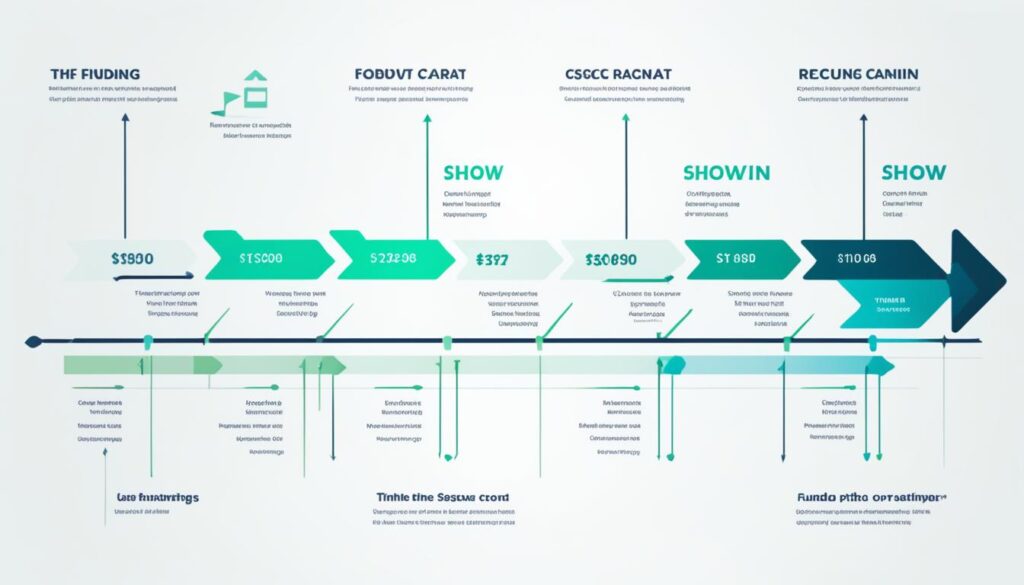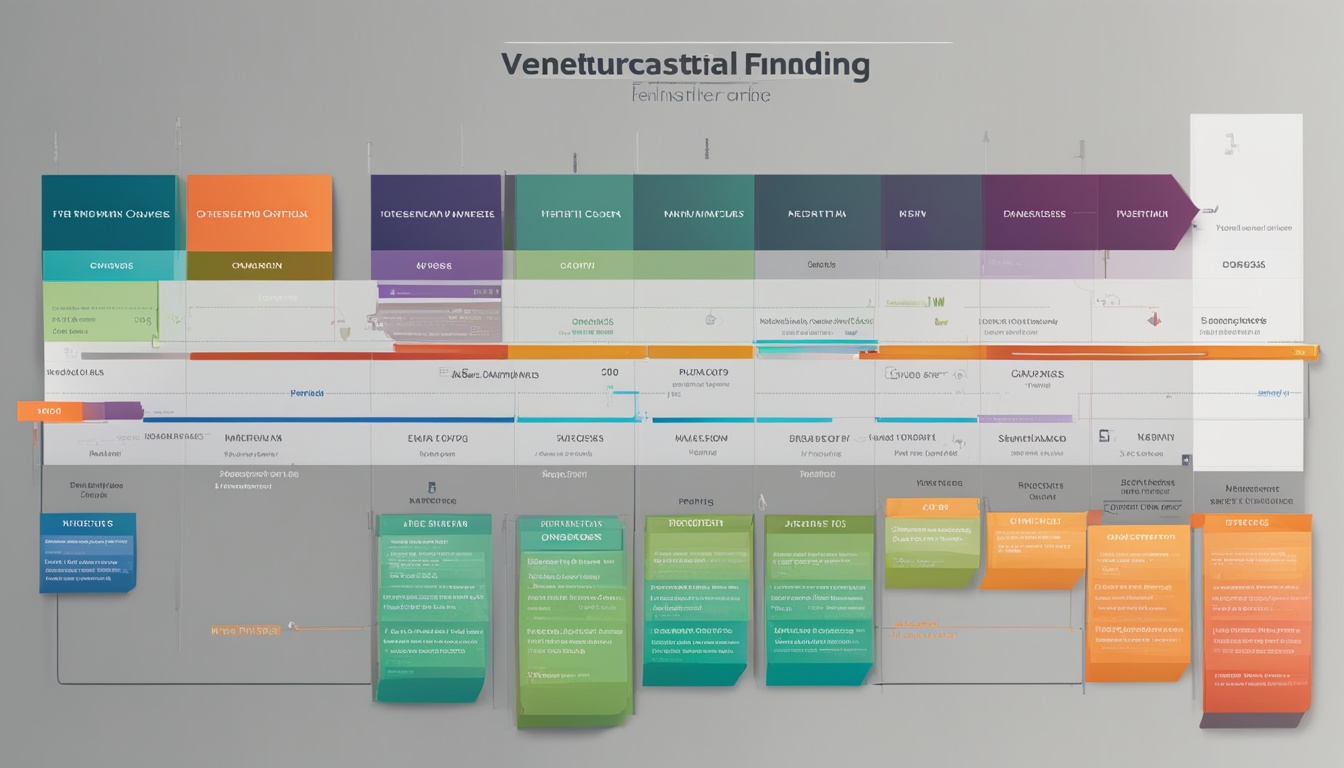Many startups see getting venture capital as a big success. But, the time it takes can be very different for each one. It can take from a few months to over a year. Usually, it takes 3 to 6 months for most. The time it takes is based on how well the startup is doing, its team, the market it’s in, and how well it fits with the investor. Have you thought about the reasons behind What factors influence the timeline for securing venture capital funding? This piece will look into the venture capital funding timeline and what impacts it. It will also guide startups through this key growth period.
Key Takeaways
- The venture capital funding process can take anywhere from 3-6 months on average, depending on various factors.
- The strength and viability of the business idea, the size and growth potential of the target market, and the startup’s founding team are key factors that influence the timeline.
- Thorough preparation, including developing a compelling business plan and building a strong investor network, can significantly improve the chances of securing venture capital funding.
- The due diligence process and negotiations around valuation and deal terms can also impact the overall timeline.
- Startups should be aware of common pitfalls, such as unrealistic expectations and poor communication, to navigate the venture capital funding process effectively.
Understanding the Venture Capital Funding Process

The venture capital world is a lively place where new businesses and smart investors meet. To get how venture capital works, let’s first look at its main ideas and steps.
What is Venture Capital?
Venture capital is a special kind of private equity that funds early or growth-stage businesses with big futures. Venture capitalists, also known as VCs, put money into these startups. They do this with the hope of getting a big return when the startup does well.
The Stages of Venture Capital Funding
The venture capital funding process has several steps, each with its goals and marks to hit. The main stages of venture capital funding are as follows:
- Seed Funding: First up is seed money. It comes from angel investors or VCs wanting to fund a startup’s beginnings. This helps the startup prove its idea and start growing.
- Series A: Once a startup shows promise, it might get series A funding. This is a bigger investment to help it grow, hire more people, and boost its product.
- Series B and Beyond: After series A, companies might get more investments like series B, C, and so on. These funds help startups keep growing, expand their markets, and reach bigger goals.
| Funding Stage | Typical Funding Range | Key Objectives |
|---|---|---|
| Seed Funding | $50,000 – $2 million | Validate business idea, build prototype, assemble founding team |
| Series A | $2 million – $15 million | Scale operations, expand team, further develop product/service |
| Series B | $10 million – $50 million | Accelerate growth, expand market reach, achieve profitability |
| Series C and Beyond | $50 million+ | Consolidate market position, expand into new markets, prepare for IPO |
Knowing the definition of venture capital and its funding stages is key for anyone hoping to fund their startup. This understanding helps entrepreneurs find the support they need to grow their business.
Factors Affecting the Timeline for Venture Capital Funding

Getting venture capital funding isn’t easy or quick. It depends on many important things that startup leaders need to know. The big factors include how strong and fresh the business idea is, the potential market size and growth, and the know-how and skill of the team behind it.
The Business Idea and Market Potential
Venture capitalists like startups with new, big ideas that can grow a lot in a large market. If a startup stands out and its product or service is clearly different, investors will pay more attention. Founders need to look deeply into their market, understand where it’s going, and show why their business is better than others to catch investors’ eyes.
The Founding Team’s Experience and Expertise
The background and skills of the startup’s team matter a lot in how quickly they can get funded. Investors prefer teams that have already done well, know a lot about their industry, and have what it takes to make their plans work. If a startup team has people who have successfully started and grown businesses before, it gives investors more trust.
The Quality of the Business Plan and Pitch
A solid business plan and a great pitch are key for startup funding. Startups must know their market, have a clear plan to grow, and a strong way to make money. How well the founders explain their company’s goals and answer tough questions also affects how soon they might get funded.
How long does it take to get venture capital funding?

The time to get venture capital funding varies. Startups in their early stages, like those in the seed or Series A round, may take 3-6 months. This period includes making a solid business plan, connecting with investors, and going through due diligence.
The Typical Timeline for Early-Stage Startups
For early-stage startups seeking venture capital, it all starts with pitching their ideas. They do this to angel investors or seed-stage venture capitalists. If the pitch goes well, they might get into a detailed due diligence process that takes 2-4 months.
The Timeline for Later-Stage Companies
Late-stage startups, on the other hand, might need 6-12 months to secure funding. This longer time is because they face a more thorough due diligence. Investors dig deep into financials, market position, and growth potential. Later-stage funding also involves complex negotiations.
The time to secure venture capital depends on several elements. These include the startup’s phase, the quality of their plan, team capabilities, and the market situation. Knowing what to expect can help entrepreneurs prepare well for the fundraising process.
Preparing for the Venture Capital Funding Process

To kick off a successful venture capital campaign, preparation is key. Begin by creating a compelling business plan. This plan should outline the startup’s objectives, the market opportunity, and its strategy for growth plus financial outlook. It needs to be detailed, backed by solid research, and appeal to investors directly.
Developing a Compelling Business Plan
A robust business plan is often vital in attracting venture capital. It must clearly state what makes the business stand out, its target audience, the competition, and financial expectations. A business plan based on data and analysis helps founders effectively convey their goals. It also demonstrates the venture’s potential for success and profit.
Building a Strong Network
Building a strong investor network is crucial too. Entrepreneurs should get involved in the startup world, attend relevant events, and use their contacts to find potential investors. Making connections with VCs, angel investors, and other key figures greatly enhances the chance of getting funded.
Navigating the Due Diligence Process

Once a startup gets the attention of venture capitalists, they start the navigating venture capital due diligence phase. This includes a deep look into the business’s legal and financial due diligence and product and market due diligence.
Legal and Financial Due Diligence
The legal and financial due diligence dives into the startup’s legal setup and money matters. Venture capitalists check the company’s contracts, rights to any inventions, debts, and money plans closely. They make sure the business is stable and follows the law.
Product and Market Due Diligence
Venture capitalists also explore what products the startup offers and its market. They check the product’s features and how it stacks up against others, plus the market’s size and how fast it’s growing. They look into who the customers are, the price plans, and how the startup plans to get its products out there.
| Due Diligence Aspect | Key Considerations |
|---|---|
| Legal and Financial |
|
| Product and Market |
|
The due diligence phase is a key part of getting venture capital. It lets investors deeply understand a startup’s chance of success. Successfully managing this review builds the trust needed for funding.
Negotiating and Closing the Deal

After a lot of investigation, the venture capital funding journey nears its end. Now, the focus is on negotiating and sealing the deal. This step involves talking about the startup’s worth, how much money it’ll get, and the investment’s conditions. Knowing the importance of having legal advice and key deal terms is critical for startups to get the best deal.
Understanding Valuation and Deal Terms
Dealing with venture capital terms means knowing a lot about startup values. Things like the chance for growth, the market size, and the money it may make in the future matter a lot. Startups need to show why they’re valuable and negotiate well to get good terms. This includes how much money they get, a fair share of the company, and what happens if the company is sold.
The Role of Legal Counsel
Having skilled lawyers during the fundraising phase is super important, especially when it comes to discussing terms. These legal pros can guide startups through the tricky parts of the deal, spot risks, and see that the deal supports the company’s future plans. They also help with the legal side of getting venture capital, making sure the startup is well-protected during talks and when sealing the deal.
Understanding how crucial it is to negotiate venture capital deal terms, know the value of a startup, and the role legal advice plays can help startups a lot. It can improve their chances of getting the money they need to grow and reach their big dreams.
Alternative Funding Options

Venture capital is a go-to choice for startups wanting investments. But, many other paths can lead to funding. Think about finding support from angel investors, online crowdfunds, and starting directly from your own pockets.
Angel Investors
Angel investors are wealthy individuals who support startups with money and advice. They invest personal funds and understand the industry well. For startups not fitting the usual venture capital bill, angel investors can offer a lifeline.
Crowdfunding
Kickstarter and Indiegogo are examples of what’s known as crowdfunding. They gather funds from many backers. It can work wonders for those selling products or services to the public. Beyond cash, crowdfunding helps create a fanbase and early product interest.
Bootstrapping
Bootstrapping is about using your own money, getting loans, or reinvesting profits. This means saying no to big investors. It’s great for keeping total control. It’s a good bet for those who can pay their own way and have a clear plan, albeit a slow road.
Common Pitfalls to Avoid
Getting venture capital funding is hard and competitive for startups. They need to steer clear of common mistakes. It’s easy to fall into the trap of unrealistic expectations. Knowing about the funding timeline and process is key. Research and setting achievable goals are vital.
Unrealistic Expectations
Many startups don’t realize how much time and work getting funding can be. It often takes months, and success isn’t certain. Going in without an accurate picture can lead to frustration and lost focus. This can harm their chances of getting investment.
Lack of Preparation
Getting ready is a must for successful fundraising. If startups don’t have a solid business plan, do market research, or make strong contacts, they’ll struggle. A lack of preparation means a weak pitch and less credibility. This ends up making it harder to get funding.
Poor Communication and Follow-Up
Good communication and follow-up matter a lot during the funding process. Startups need to be quick with investor questions and updates. If they don’t, they might miss chances. Poor communication and follow-up make a bad impression. It could hurt their credibility with possible investors.
